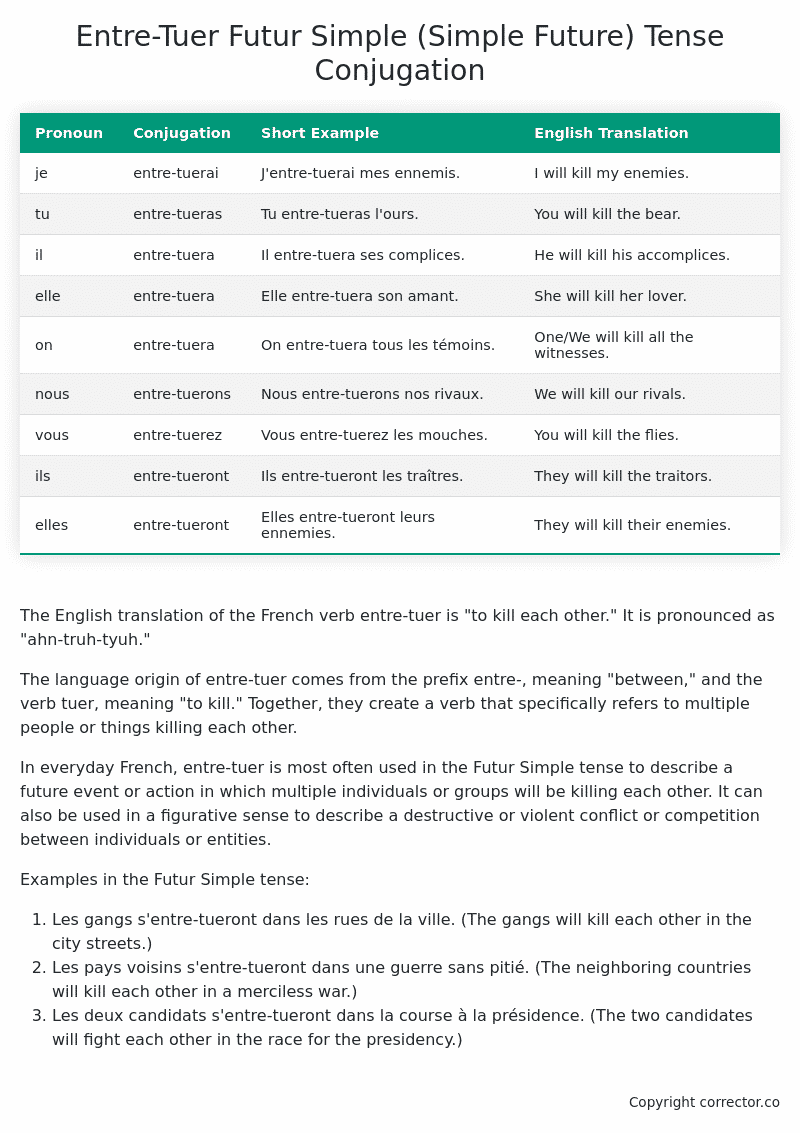Futur Simple (Simple Future) Tense Conjugation of the French Verb entre-tuer
Introduction to the verb entre-tuer
The English translation of the French verb entre-tuer is “to kill each other.” It is pronounced as “ahn-truh-tyuh.”
The language origin of entre-tuer comes from the prefix entre-, meaning “between,” and the verb tuer, meaning “to kill.” Together, they create a verb that specifically refers to multiple people or things killing each other.
In everyday French, entre-tuer is most often used in the Futur Simple tense to describe a future event or action in which multiple individuals or groups will be killing each other. It can also be used in a figurative sense to describe a destructive or violent conflict or competition between individuals or entities.
Examples in the Futur Simple tense:
- Les gangs s’entre-tueront dans les rues de la ville. (The gangs will kill each other in the city streets.)
- Les pays voisins s’entre-tueront dans une guerre sans pitié. (The neighboring countries will kill each other in a merciless war.)
- Les deux candidats s’entre-tueront dans la course à la présidence. (The two candidates will fight each other in the race for the presidency.)
Table of the Futur Simple (Simple Future) Tense Conjugation of entre-tuer
| Pronoun | Conjugation | Short Example | English Translation |
|---|---|---|---|
| je | entre-tuerai | J’entre-tuerai mes ennemis. | I will kill my enemies. |
| tu | entre-tueras | Tu entre-tueras l’ours. | You will kill the bear. |
| il | entre-tuera | Il entre-tuera ses complices. | He will kill his accomplices. |
| elle | entre-tuera | Elle entre-tuera son amant. | She will kill her lover. |
| on | entre-tuera | On entre-tuera tous les témoins. | One/We will kill all the witnesses. |
| nous | entre-tuerons | Nous entre-tuerons nos rivaux. | We will kill our rivals. |
| vous | entre-tuerez | Vous entre-tuerez les mouches. | You will kill the flies. |
| ils | entre-tueront | Ils entre-tueront les traîtres. | They will kill the traitors. |
| elles | entre-tueront | Elles entre-tueront leurs ennemies. | They will kill their enemies. |
Other Conjugations for Entre-Tuer.
Le Present (Present Tense) Conjugation of the French Verb entre-tuer
Imparfait (Imperfect) Tense Conjugation of the French Verb entre-tuer
Passé Simple (Simple Past) Tense Conjugation of the French Verb entre-tuer
Passé Composé (Present Perfect) Tense Conjugation of the French Verb entre-tuer
Futur Simple (Simple Future) Tense Conjugation of the French Verb entre-tuer (this article)
Futur Proche (Near Future) Tense Conjugation of the French Verb entre-tuer
Plus-que-parfait (Pluperfect) Tense Conjugation of the French Verb entre-tuer
Passé Antérieur (Past Anterior) Tense Conjugation of the French Verb entre-tuer
Futur Antérieur (Future Anterior) Tense Conjugation of the French Verb entre-tuer
Subjonctif Présent (Subjunctive Present) Tense Conjugation of the French Verb entre-tuer
Subjonctif Passé (Subjunctive Past) Tense Conjugation of the French Verb entre-tuer
Subjonctif Imparfait (Subjunctive Imperfect) Tense Conjugation of the French Verb entre-tuer
Subjonctif Plus-que-parfait (Subjunctive Pluperfect) Tense Conjugation of the French Verb entre-tuer
Conditionnel Présent (Conditional Present) Tense Conjugation of the French Verb entre-tuer
Conditionnel Passé (Conditional Past) Tense Conjugation of the French Verb entre-tuer
L’impératif Présent (Imperative Present) Tense Conjugation of the French Verb entre-tuer
L’infinitif Présent (Infinitive Present) Tense Conjugation of the French Verb entre-tuer
Struggling with French verbs or the language in general? Why not use our free French Grammar Checker – no registration required!
Get a FREE Download Study Sheet of this Conjugation 🔥
Simply right click the image below, click “save image” and get your free reference for the entre-tuer Futur Simple tense conjugation!

Entre-Tuer – About the French Futur Simple (Simple Future) Tense
Formation of Futur Simple
For regular -er verbs (e.g., parler – to speak)
For regular -ir verbs (e.g., finir – to finish)
For regular -re verbs (e.g., vendre – to sell)
Common Everyday Usage Patterns
Conditional Statements
Interactions with Other Tenses
Futur Antérieur
Conditional
Present
Summary
I hope you enjoyed this article on the verb entre-tuer. Still in a learning mood? Check out another TOTALLY random French verb conjugation!


